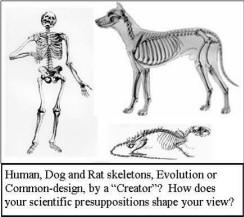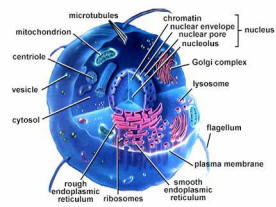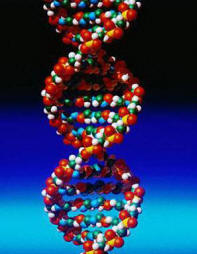
5. Created in the Image of God: Genesis 1:26-31
6. The Garden of Eden: Genesis 2
8. Offspring of Adam and Eve: Genesis 4-5
Worldviews and Science: The effects of Presuppositions
 What
is the origin of the universe and life? This question has infused
itself into the very fabric of science, religion and philosophy.
The answer to this question shapes the worldview of society and
civilization, whether we like it or not.
What
is the origin of the universe and life? This question has infused
itself into the very fabric of science, religion and philosophy.
The answer to this question shapes the worldview of society and
civilization, whether we like it or not.
There are three views we will examine in regards to Origins, Scientific Creationism, Theistic Evolution and Secular (Atheistic) Evolution. To understand the basis of each of these views, it is important to understand the foundation of their views.
This topic of origin is not limited to science or theology. Science and theology both claim to reveal “Truth” about the source of our origin. Each discipline approaches the “truth of origin” from a predefined view of the world. Another term used for “a pre-defined view of the world” is a worldview. Presuppositions are specific beliefs within our worldview.
The importance of Worldviews
First we need to examine the importance of worldview and the impact they have in our quest for the truth. Let’s examine the underpinnings of morality in atheism for example. We need to ask some questions about who we are.
Are we just highly evolved animals? And if we are just animals, why is it wrong to kill or hurt, what is the basis of our moral law? Are we just an accident? If we are just an accident are we really any more important then, leaf on a tree which is here today and rotting tomorrow? If life is an accident, then what is the purpose of anything we do? This is the basis of the position of Nihilism as defined below. Frederick Nietzsche (1844-1900) the atheist philosopher, who advocated the strong overcoming the weak was the philosophical basis of Hitler’s worldview.[1] He was also a proponent of Nihilism.
Nihilism (from the Latin nihil, nothing) is the philosophical position that values do not exist but rather are falsely invented.[1] Most commonly, nihilism is presented in the form of existential nihilism which argues that life[2] is without meaning, purpose or intrinsic value. Moral nihilists assert that morality does not exist, and subsequently there are no moral values with which to uphold a rule or to logically prefer one action over another. Nihilism can also take the form of epistemological, metaphysical or mereological nihilism.[2]
Nihilism is the honest conclusion to the view we are the end-result of a series of accidents starting with the “Big-Bang”, the formation of life, and eventually our existence. Think about it, why is the life of a human being of any greater value then a mouse or a fish? Further what is the value of any life; it was all part of the great cosmic accident, here today gone tomorrow, all meaningless, nothing, hence the term “Nihilism”.
This is an example of how our basis of origin has a direct impact on our philosophical outlook on the world we live in.
The basis of worldviews
A Worldview is the basis of how we perceive the world. When we wake up in the morning, we already have an understanding of the world whether we like it or not. This understanding of the world is shaped by several factors, not necessarily in any particular order. The importance of each of these factors might vary from individual to individual.
1. Culture: The philosophical understanding of the world from the communities we live and participate, they include family, ethnicity and associations. Their understanding of the world seeps into our thoughts and perceptions from the time we are children to the present.
2. Education: Often at odds with culture, this method can be the systematic learning of the schools, elementary, primary, university and vocational which infuses our understanding of the world. For example, a child might be confronted by beliefs outside of the culture and religion at school. The processing of this conflict shapes a person’s worldview.
3. Religion: A set of beliefs, which a person holds based, these could be cultural or can differ from the culture a person was raised.
4. Experiences: Personal events in a person’s life have an impact on shaping the way the world is viewed by each person.
6. Environment: The area we live is going to direct impact on our understanding of the world, someone who lives in the desert, will see the world from a different vantage as one who live in the artic.
7. Family: From the time we are children, the people who we spend a great deal of impact on our view will be those close to us. Our parents, brothers, sisters, aunts and uncles views will flow into our view in one way or another.
9. Friends: The power of what our peers think and feel about the world will also shape our perception.
All these factors and more will shape our understanding of the world and form our worldview. Everybody has a worldview. One of the elements of our worldview is our presuppositions on our origin.
Scientific Presuppositions[3]
When each of us approaches the subject of our origins, we must be able to identify our own presuppositions. Our worldview is the overall view of the world, while presuppositions are the specific parts which form our worldview. For example, our view on the existence of God is a presupposition which will shape our worldview.
Our view of how we came, our origin can be classed into three classifications, Creationism[4], Theistic evolution or Chemical/Accidental Evolution is a presupposition we bring to the table when we form our views. Let’s first define each position before we start. (Intelligent Design would include both Creationism and Theistic Evolution since both lay claim to an “Intelligent” cause.)
Scientific Creationism: The view that life and the universe were created directly by God as defined in Genesis, in a literal 6-day period. The descent of humanity and the geological record validates the biblical account as recorded in Genesis. Science validates the biblical account of creation and the flood.
Theistic Evolution: Asserts that classical religious teachings about God are compatible with much or all of the modern scientific understanding about biological evolution. In short, theistic evolutionists believe that there is a God that he is (in some way) the creator of the material universe and (by consequence) all life within, and that biological evolution is simply a natural process within that creation. Evolution, according to this view, is simply a tool that God created and employed to help life grow and flourish[5].
Atheistic Evolution: The belief that the universe and matter exploded into existence without a super-natural explanation. Matter then formed into galaxies of stars, eventually the earth formed from a collection of matter. On earth, life came into existence through accidental events and combination of chemicals (Chemical Evolution). Life progressed from a single cell through random mutations into complex life as exist today.
 Faith
vs. Science
Faith
vs. Science
Faith is often associated with religion, while reason and facts are associated with science, is this reasonable view? Can aspects of science be faith-based, or is it only objective-observation? Faith is defined as, “Confident belief in the truth, value, or trustworthiness of a person, idea, or thing.” For example, when you get into an airplane, you have “faith” the airplane will be able to carry you to your destination. The evidence of your faith is your willingness to put your life in your hands.
Believing the trustworthiness of theory is also called faith. To believe as an atheists, that matter came into existence of nothing, or that life formed from non-life is faith.
How do we define science? The word science comes from
the Latin "scientia," meaning knowledge.
 According
to Webster's New Collegiate Dictionary, the definition of
science is "knowledge attained through study or practice," or
"knowledge covering general truths of the operation of general laws,
esp. as obtained and tested through scientific method [and]
concerned with the physical world." The two foundational principals
of atheistic evolution require belief in two untested,
non-verifiable positions. This is an example how
scientific-presuppositions shape beliefs in the unprovable.
According
to Webster's New Collegiate Dictionary, the definition of
science is "knowledge attained through study or practice," or
"knowledge covering general truths of the operation of general laws,
esp. as obtained and tested through scientific method [and]
concerned with the physical world." The two foundational principals
of atheistic evolution require belief in two untested,
non-verifiable positions. This is an example how
scientific-presuppositions shape beliefs in the unprovable.
· To believe matter came out of existence without a cause, requires faith
· To believe that chemicals of life just came together by chance requires faith.
Once our minds accept the mutability of matter and the new idea of the vacuum, we can speculate on the origin of the biggest thing we know - the universe. Maybe the universe itself sprang into existence out of nothingness - a gigantic vacuum fluctuation which we know today as the big bang. Remarkably, the laws of modern physics allow for this possibility. (Pagels, 1982, 247)[6]
 Scientific
Creationism
Scientific
Creationism
A. Ex-Nihlo: God created matter and the Universe out of nothing. Science affirms the starting point of the universe as demonstrated in the following ways:
1. Expansion of the Universe requires a starting point. Red Shift,
2. Entropy of Energy (2nd Law of Thermodynamics) requires the move from order to disorder.
3. Law of relativity demonstrates finite universe that had a beginning.
B. Creation of Life:
1. The mathematical improbability scientifically demonstrates creation
2. “Design” demonstrates Creation
3. Protein or DNA, which came first? (MRNA is required for Protein)
C. Noah’s Flood:
1. Oil & Coal are Hydro-Carbon buried beneath the Earth’s surface (Dead Animal’s and Vegetable Matter.
2. Whale bones and Sea Life on tops of mountains.
3. Antarctic was tropical
4. Land was all connected

Atheistic Evolution
· Everything out of nothing: Matter and the universe exploded out of nothing, requires faith. Since there is no “God” to intelligently cause the universe, where did the matter and energy come from? Science points us to a “finite” universe, therefore there was a “Cause”, Einstein understood this when he realized the universe was not static.
· Accidental formation of the universe: Since there is no intelligence, everything is accidental the result of random events, turning out to form ordered events. Order from non-order takes faith, since we do not see this as an ongoing event.
· Accidental formation of a planet: All the right circumstances are required to form the planet Earth, the formation of the right materials, the formation of water on the planet surface, the atmosphere, gravity are all accidental events since there is not “Intelligence” at the cause. Then the earth must have the right orbit, from the Sun not to make the earth too cold or too hot to prevent life from accidentally forming.

· Accidental formation of life: On top of all these accidental events is the accidental formation life, the right combination of chemicals to form the building blocks of life. Then the combination of these building blocks to replicate itself, since if it could not replicate itself, it would be a one time event. Think of all the accidental events to form the “First Life”, yet the first life dies after everything, because it cannot replicate itself.
· Accidental formation of complete & Identical Protein & DNA: When you look at cell and see the DNA, understand the DNA is only the blue-print, we still must be able to take the prints and create the product. The cell has both the “Blueprints” (DNA) and the product of the Blueprints the proteins
[1] Worldview: A worldview is the basis in which one perceives the world. They are the glasses of perception. Views such as the world as meaningless collection of accidents, or a created, determined place by a creator are two opposite worldviews.
[2] http://en.wikipedia.org/wiki/Nihilism
[3] In the linguistic branch of pragmatics, a presupposition is an implicit assumption about the world or background belief relating to an utterance whose truth is taken for granted in discourse. A presupposition must be mutually known or assumed by the speaker and addressee for the utterance to be considered appropriate in context. It will generally remain a necessary assumption whether the utterance is placed in the form of an assertion, denial, or question, and can be associated with a specific lexical item or grammatical feature (presupposition trigger) in the utterance.
[4] Intelligent Design asserts that life has its origins through intelligence, without identifying the intelligence.
[5] http://en.wikipedia.org/wiki/Theistic_evolution
[6] Pagels, Heinz. 1982. The Cosmic Code. Toronto: Bantam.